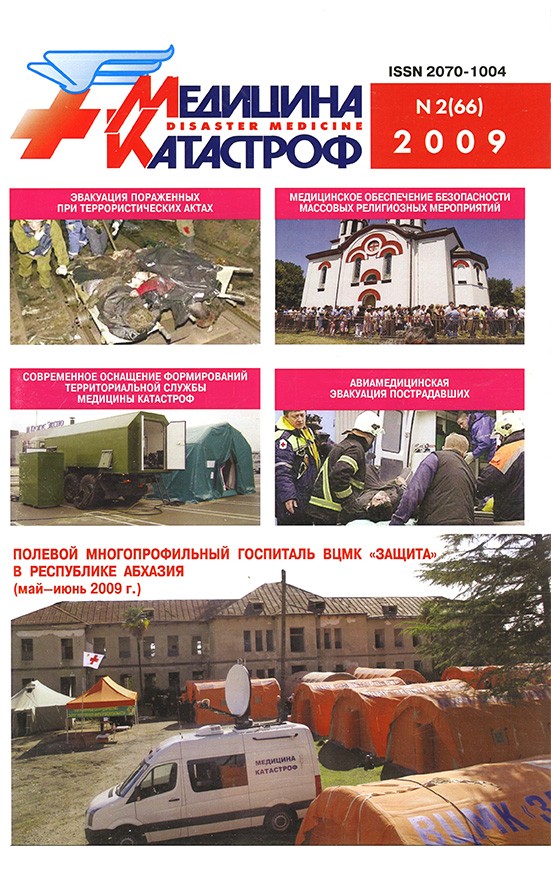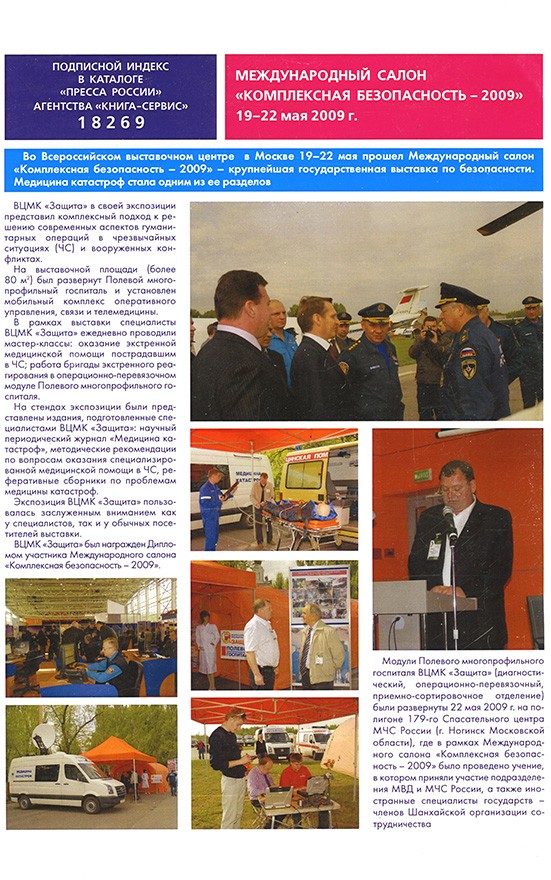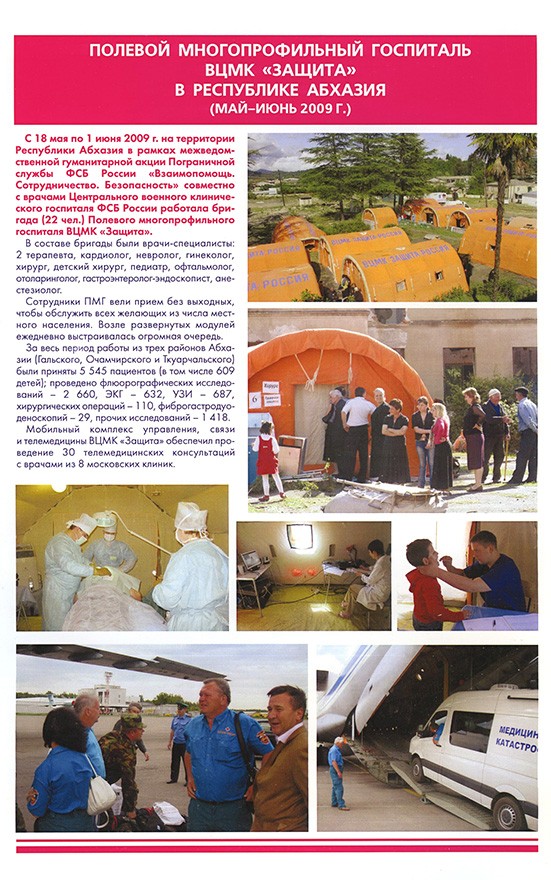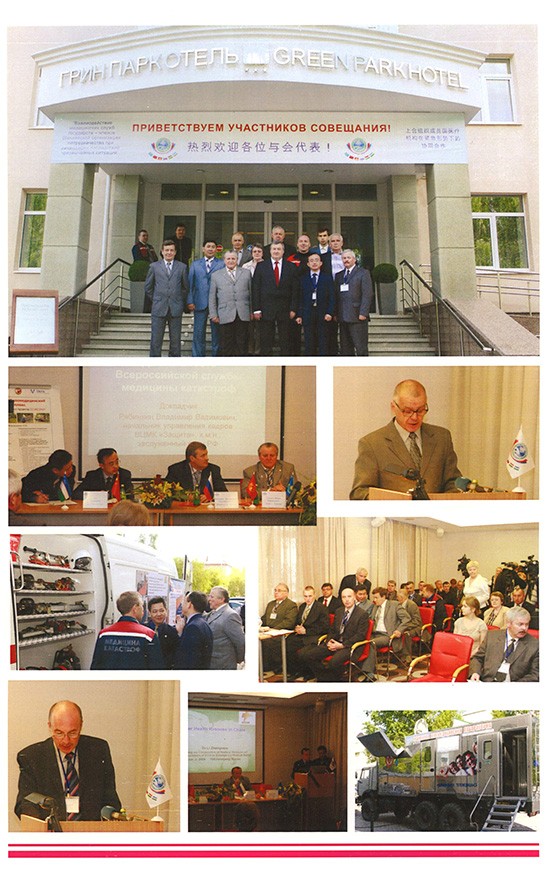ORGANIZATION AND TACTICS OF DISASTER MEDICINE SERVICE
1. Goncharov S.F., Avramenko V.A., Bobiy B.V. Casualties of Terrorist Attacks
Report 3
The results are presented of the research on the issues of casualties of terrorist attacks with use of explosive devices and other conventional weapons classified as emergency situations in the territory of Russia in 1999–2005. The major problems of medical-evacuation care of the casualties of terrorist attacks are discussed.
Key words: casualties, emergency situations, medical-evacuation support, terrorist attacks, wounded
2. Avramenko V.A. On the Issue of Evacuation of Terrorist-Attack Casualties
The experience of evacuation to hospitals of terrorist-attack casualties with emphasis on sufficiency of ambulances and mobile intensive care units used for the purpose is analyzed. Average statistics on the number of hospitalized patients per available ambulance in the Russian Federation and in some of its constituent territories are presented. A conclusion is drawn on approximate correlation between the number of terrorist-attack casualties and the number of ambulances needed for their evacuation to hospitals.
Key words: evacuation of casualties to hospitals, number of ambulances, terrorist attacks
3. Lobanov A.I. Specifics of Management of Medical Aspects of Security of Mass Religious Events
The analysis of threats and risks concerning health and survival of participants of mass religious events is carried out. Domestic and foreign experience of planning and management of medical aid to casualties of emergency situations during mass religious events is dealt with.
Key words: mass religious events, medical and sanitary consequences of emergency situations, planning and management of medical support of religious events
4. Amirov A.M., Ehrtukhanov M.-Sh.S., Davydov V.N. Experience of Management of Medical Care Rendering to Wounded in Counter-Terrorist Operation in Dagestan in 1999
The experience of management of medical care rendering to wounded in counter-terrorist operation in Dagestan in 1999 is presented. The factors that affect the system of medical-evacuation support of joint force are given consideration. The experience of rendering of different types of medical care at the stages of evacuation is analyzed and summarised with indication of their scope and time frame.
Key words: casualties, counter-terrorist operation, joint force, management of medical-evacuation support, Republic of Dagestan, types of medical care
5. Kovalyov V.A., Maslova O.A. Organizational and Legal Pequliarities of Production and Usage of Drugs in Russian Federation and Some Foreign Countries as an Important Factor Influencing Stockpiling of Medical Supplies for Emergency Situation
The authors give general characteristics of healthcare products and drugs market in the Russian Federation, the structure of preparations and medical equipment entering the Russian market. They refer to legal acts that regulate production, usage and quality control of healthcare products and drugs in Russia. A comparison of the regulatory systems concerning production and usage of drugs effective in this country and in some European states is done.
Key words: farmaceutical market, import of medical supplies, normative legal base of surveillance in the sphere of health care, quality control of healthcare products, stockpiling of medical supplies
6. Burenkov M.S., Vlasenko V.F. , Pichugin V.Yu. Analysis of the sanitary medical problems of possible emergencies, caused by collision of Earth with spinars of natural origin
The results of analysis of medical and sanitary problems of potential emergency situations caused by Earth’s collision with natural space objects are presented. A problem of asteroid-comet hazard is analyzed. Some suggestions on the setting up of a specialists taskforce are made and draft additions to GOST (state standards) concerning the problem are prepared.
Key words: asteroid-comet hazard, emergency situations, medical and sanitary problems, natural space objects
CLINICAL ASPECTS OF DISASTER MEDICINE
7. Zhigunov A.K., Aslanov A.D., Kardanov A.V., Taukenova L.I., Tlepshev Kh.Kh., Iskhak L.N. Medical Сare for Сasualties with Сoncomitant Injuries at Prehospital Stage
The experience of prehospital management of casualties with concomitant injuries by specialists of emergency teams and of the Disaster medicine center of Kabardino-Balkarian Republic is presented. All remedial measures in 1,430 cases of injuries in the years 1997–2008 are analyzed. The emphasis is placed on the peculiarities of medical care delivery at prehospital stage to those injured in high-mountain areas (43 cases). The analysis of quality of management of patients with concomitant injuries is carried out and practical recommendations on improvement of medical care provision by emergency teams at prehospital stage are given as well as the evaluation of the results of their implementation.
Key words: anesthesia, concomitant injuries (frostbites or frigorism + mechanical injury), fluid therapy, Kabardino-Balkarian Republic, modern opioids, prehospital stage, resort zone
8. Sinopalnikov I.V. Specifics of Management of Medical Care and Treatment of Contagious Patients during Local Military Conflict in Afghanistan (1979–1989)
Management of medical care of contagious patients was the most complicated problem of medical support of troops during the conflict. The number of patients with infectious diseases during the whole war period amounted to 281,622 (63.5% of all sanitary losses). A new and effective system of medical care provision to contagious patients was elaborated and put into practice to better infectious diseases outcome. The total lethality associated with epidemic infectious diseases dropped between 1985 and 1989 16-fold and lethality caused by all acute infections has substantially lowered: in case of viral hepatitis – 8-fold, amebiasis – 5-fold. Of those affected by infectious diseases in Afghanistan 99.6% were returned to duty.
Key words: contagious patients, management of medical care provision to contagious patients, multi-infections, sanitary losses in Afghanistan
9. Kurilovich A.V., Mutalibov M.M., Fidarov Eh.Z., Bitiev M.S., Nigkoev A.V. Neurosurgical Treatment of Casualties of Georgian-South Ossetian Conflict
The structure and character of battle wounds in present-day armed conflicts in comparison with the Great Patriotic War time are analyzed and the experience of work of 236th Military Hospital during the Georgian-South Ossetian conflict is described.
The emphasis is placed on complex diagnostics of ballistic craniocerebral injuries, evacuation procedure of neurosurgical casualties and surgical measures at the specialized medical aid stage.
Key words: analysis of structure of medical losses, battle wounds, diagnostics of ballistic craniocerebral injuries, evacuation of postoperative patients, structure of injuries
10. Dorovskikh I.V., Zakovryashin A.S., Zhizdyuk A.A., Maltsev G.Yu., Stymkovskaya S.K., Zakovryashina S.E. Global Amnesia Syndrome: Myths and Clinical Reality
Global amnesia syndrome is discussed. Analysis of a clinical case of global amnesia that enables one to form a notion of genesis and clinical characteristics of this type of psychic pathology is performed. Views of Russian and foreign researchers on the issue of genesis of memory impairment are summarized.
Key words: global amnesia, clinical case of global amnesia, memory impairment
11. Il’yashenko K.K., Alekhnovich A.V., Yel’kov A.N., Livanov A.S. Influence of Metabolic Correction on Compensatory-Adaptive Processes in Acute Poisoning with Psychotropic Preparations
The key parameters of homeostasis of 220 patients with severe psychotropic poisoning were subjected to сentroid method factor analysis for a comparative study of influence of metabolic correction on functional systems formation.
It was found that use of preparations with metabolic effect was accompanied with lower number of signs and values of factor loads predominant in formation of organism responses, homeostatic and morphofunctional systems. It is considered expedient to include metabolic action preparations into therapy measures in cases of acute poisoning with psychotropic preparations.
Key words: acute poisoning, adaptation, compensatory-adaptive processes, functional system, metabolic correction, psychotropic preparations
12. Azov N.A., Azova E.A. A Version of Severity Scoring of Shock and of Prognosis of its Course among Children at Different Medical Care Stages
A simple and affordable method of instant diagnosis of shock is suggested. The method is based on the speed of saliva flow measured by the time needed for passive impregnation of indicator paper of the saliva-system (Omnisal-saliva diagnostics system, Singapore Pte Ltd) with 1 ml of saliva. The dependence of this time on the severity of сourse of shock is found out. The criteria are elaborated that can make it possible to objectively differentiate the shock severity at prehospital stage, to prognosticate the duration and outcome of this formidable critical state. The method’s advantages are: it is non-invasive, it does not call for special or expensive equipment and is not time-consuming. It is technically simple and easy-to-use especially at prehospital stage.
Key words: children, instant diagnosis, saliva-system, shock
MEDICAL ASPECTS OF ROAD TRAFFIC SAFETY
13. Borisenko L.V., Akin’shin A.V., Ivashina L.I. Some Problems of Medical Care Rendering to Casualties of Traffic Accidents at Prehospital Stage
An analysis of composition of emergency medical service teams rendering medical care to traffic accident casualties along the major federal routes is presented. The analysis indicates that in a number of regions medical care is provided mainly by ambulance attendants. The necessity of improvement of normative legal base that regulates the issue of medical care to traffic accident casualties by teams of ambulance attendants at prehospital stage is stressed as well as the need of measures aimed at higher professional qualification of teams personnel.
Key words: ambulance equipment, doctor and feldsher emergency medical service teams, normative legal base, rendering of medical care, standards of emergency medical care, traffic accidents
14. Kipor G.V., Goncharov S.F., Bessonov V.A., Ishkov A.S. Influence of Complex of Information-Ergonomic Factors on Psychophysiological Status of Drivers
Report I. Variation Characteristics and Graphic Models of Functional Asimmetry Status
The results demonstrating cumulative impact of traffic and road signs, outdoor advertising, road interchanges, green planting, and buildings on psychophysiological status of drivers are received with use of methods of assessment of intricate bilateral sensomotor reaction of drivers and of applied research technology based on multivariate statistics. The rules of objective quantitative evaluation of psychophysiological status are elaborated. The technologies of statistical analysis of large data files of primary characteristics, of their interpretation, graphical representation and further interpretation while developing integral indexes.
Key words: functional asymmetry, functional status, hemispheric asymmetry, mental processes, multivariate methods of analysis, psychophysiological status, system complex «road environment»
SANITARY-ANTIEPIDEMIC (PREVENTION) MEASURES IN EMERGENCIES
15. Volodin A.S., Shaposhnikov A.A., Belyakova I.P., Zheleznyak V.N., Kashirsky A.A. Modern Protection Facilities for Teams of Territorial Disaster Medicine Service from Factors of CBR Origin
Medical teams of Territorial Disaster Medicine Service for dealing with emergencies of Chemical/ Biological/Radiation (CBR) origin implement special measures at the prehospital stage within the framework of radiation, anti-chemical and epidemiological protection of population, medical personnel and rescuers.
These teams should be provided with an array of preparations for rendering medical care at the prehospital stage, with individual protective means, real-time contamination-control equipment and sampling kits.
In case of large-scale contamination mobile medical-prophylactic units are of special importance.
Modern portable individual means and mobile facilities described in the contribution are the basis of medical support and epidemiological protection of population in case of emergency.
Key words: Chemical/Biological/Radiation (CBR)-origin emergencies, medical teams, medical teams equipment, mobile medical-prophylactic complexes, prehospital stage, sanitary and epidemiological protection
DISCUSSIONS
16. Kuznetsova I.N. Indications for Use of Perftoran (a commentary on the opinion published in our 1 (61) issue)
OUR ACTIVITY EXPERIENCE
17. Nemaev S.V., Akin’shin A.V. Aeromedical Evacuation of Burn Casualties from Vladikavkaz to Moscow
The contribution presents the experience of aeromedical evacuation of burn casualties aboard a TU-134 unequipped for the purpose from Vladikavkaz to Moscow. The prerequisites for use of unaccommodated planes for long-distance and long-duration aeromedical evacuation are reviewed as well as the procedure of loading of casualties and other issues.
Key words: aeromedical evacuation, burn casualties, planes unequipped for aeromedical evacuation, TU-134 aircraft
18. Filippov A.Yu., Popov A.S. Aeromedical Evacuation of Victims of Collapsed Building
The article contains information on practical use of airborne modules for aeromedical evacuation of casualties and describes its procedure.
Key words: aeromedical evacuation, airborne modules for aeromedical evacuation, evacuation of casualties, medical evacuation service, polytrauma, transportation in case of multisystem injury
SHORT REPORTS
19. Kovalyov V.A. Some Results of Monitoring of Condition of Medical Equipment Used for Emergency Medical Care of Injured
Some results of monitoring of condition of medical equipment used for emergency medical care of injured are presented. A number of suggestions on amendments in current law of the Russian Federation called for by development of new medical products or creation of their experimental models are made.
Key words: emergency medical care, medical equipment
INFORMATION
20. Kipor G.V. On the 16th World Congress of WADEM on Disaster and Emergency Medicine
21. Second International Workshop on Disaster Casualties (University of Cambridge, UK, 15–16 June 2009)
22. Kipor G.V. Plenary meeting of the Committee of the Chiefs of Military Medical Services in NATO (COMEDS) (Bern, Switzerland, May 20–22, 2009)
23. Buchinsky V.S., Il’ina G.P. Tenth Anniversary of Territorial Disaster Medicine Centre of Irkutsk Region
24. Borisenko L.V. HIMSS09 Annual Conference on Health IT (Chicago, April 4–8, 2009)
25. Borisenko L.V. All-Russian Scientific-Practical Conference «Emergency Medical Aid-2009»
26. Sakhno I.I. Conference of Representatives of Shanghai Cooperation Organization Member States in Yekaterinburg (June 2–3, 2009)




